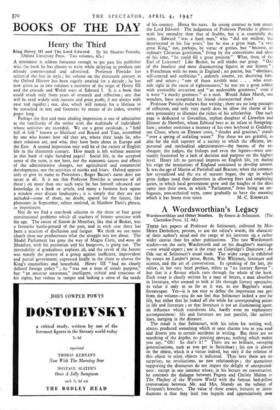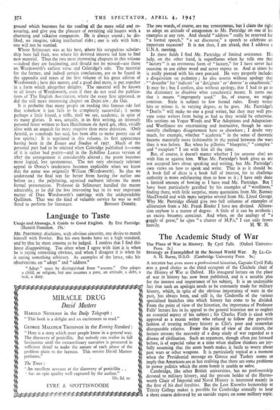A Wordsworthian's Legacy
THESE last papers of Professor de Selincourt, collected by Miss Helen Darbishire, present, to use the editor's words, the character of their author's mind and the range of his interests oil-a rather wider canvas than his other publications. The two Wordsworth studies—on the early Wordsworth and on his daughter's marriage —one would expect ; nor is the essay on Coleridge's Dejection : An Ode out of Selincoures usual track. The wider range is exhibited by essays on Landoes prose, Byron, Walt Whitman, literature and science, and the art of conversation. In speaking of the last, the r editor, in her very brief, preface, refers to its literary flavour " ; but that is a flavour Which runs through the whole of the book. Each essay is clearly written by a man of letters, a man absorbed in literature, who seemed to look at life through literary spectacles, to value it only in so far as it was, to use Bagehoes word, literatesque. Yet—it is not easy to define the impression one gets from the volume—you do not feel that Selincourt lacked a zest for life, but rather that he looked all the while for corresponding points in life and literature ; so that literature is not an illuminating agent, an influence which transforms life, hardly even an explanatory accompaniment: life and literature are just parallel, like railway lines, merging in the distance. The result is that Selincourt, with his talent for writing well, always produced something which at once charms you as you read and directs you to certain accidents in writing. But there are no searching of the depths, no piercing aperfus, nothing which makes you say, "Oh! So that's it!" There are no brilliant, sweeping generalisations, such as you get in Saintsbury ; his eye is always on the object, which is a virtue indeed, but only if the relation of this object to other, objects is indicated. Thus here there are no surprises, no revaluations, no new relationships ; the quotations supporting the discourses do not impart the delight of unexpected- ness: except in one instance where, in his lecture on conversation, he contrasts the dialogue between Pegeen and Christy Mahon in The Playboy of the Western World with the famous bed-pillow conversation between Mr, and Mrs. Shandy on the subject of Tristram's breeches. The value of these essays, lectures or intior duotions is that they lead you happily and appreciatively over
ground which becomes for the reading all the more solid and re- assuring, and give you the pleasure of revisiting old haunts with a charming and talkative companion. He is always sound ; he dis- liked, we imagine, taking intellectual risks ; one is safe with hum; one will not be startled.
Where Selincourt was at his best, where his scrupulous scholar- ship bore full fruit, was where his devoted interest led him to find new material. Thus the two most interesting chapters in this volume —indeed they are fascinating, and should not he missed—are those on Wordsworth's earliest vu-se and Coleridge's ode. The material for the former, and indeed certain conclusions, are to be found in the appendix and notes of the first volume of his great edition of Wordsworth ; here this matter, and a good deal more, is put together in a form which altogether delights. The material will be known to all lovers of Wordsworth, even if they do not read the publica- tions of The English Asseciation, where the essay first appeared, as did the still more interesting chapter on Dejec:ion : An Ode.
It is probable that many people oft reading this famous ode feel that somehow it just fails to be completely successful ; it seems perhaps a little forced, a trifle, shall we say, academic, in spite of its many glories. It was, actually, in its first writing, an intensely personal letter written to Sara Hutchinson On April 4th, 1802, vividly alive with an anguish far more eruptive than mere dejection. (Only Arnold, as somebody has said, has been able to make poetry out of low spirits.) It is reprinted in this volume, its first appearance having been in the Essays and Studies of 1937. Much of the personal part had to be omitted when Coleridge published it—some of it is rather bad poetry—and in the Sybilline Leaves version of 1817 the arrangement is considerably altered ; the poem becomes more logical, less spontaneous. The not very obviously relevant appeal to °may's tenderness becomes explicable when we know that the name was originally William (Wordsworth). So that we understand the final text far better from having the earlier one before us ; the palpitating, agonised outburst informs the more formal presentation. Professor de Selinceurt handled the matter admirably, as he did the less interesting but in its way important matter of Dora Wordsworth's marriage with the undependable Quillinan. That was the kind of valuable service he was so well



































 Previous page
Previous page